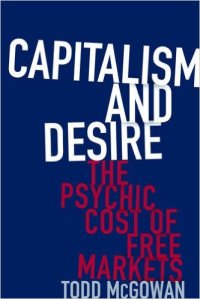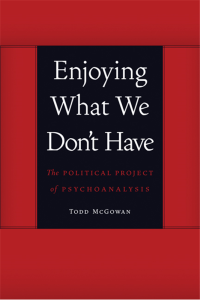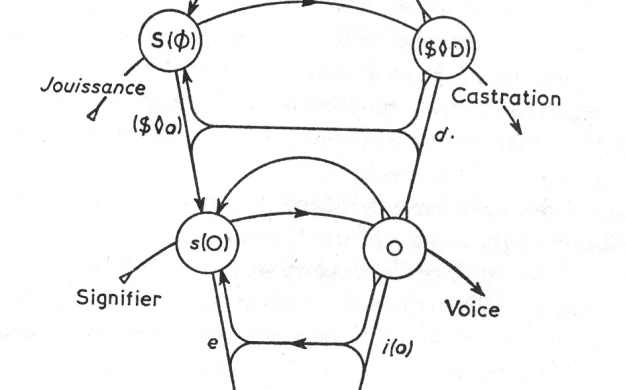In this HKRB Interview Frank Smecker asks Lacanian Todd McGowan about condoning the unbearable enjoyment of loss, the radicality of psychoanalysis and the political situation with Trump and Sanders today.
Todd McGowan is a philosopher, a film theorist, and professor at the University of Vermont. He is also a member of the Central Committee for LACK, “a new organization devoted to the promotion and development of Lacanian psychoanalytic theory.” A prolific author of theoretically scintillating books and essays on film, philosophy, and psychoanalysis, McGowan’s latest book, Capitalism and Desire: The Psychic Cost of Free Markets, will be available September 2016. Here, I was able to ask him some questions about his new book, the premise of which declares that the operative mechanisms of capital imitate the structure of our desire while concealing the trauma that such a system yields.

Frank Smecker: Desire and capitalism, they seem to share an annular relationship with each other: they both generate and aggravate real problems to which they then offer themselves as a form of relief or solution. Will you say more about this self-perpetuating cycle?
Todd McGowan: Capitalism writes itself on top of the logic of desire, which is why it has been so successful as a socioeconomic system and why it appears eternal. But at the same time, capitalism hides from us the trauma inherent in our desire — the fact that desire is inextricably tied to loss and serves only to reactivate loss rather than eliminating it. The satisfaction that capitalism produces stems from the incessant failure of desire to realize itself, but capitalism blinds us to this link between failure and satisfaction. It enables us to believe in the possibility of success, which hides the traumatic fact that our only satisfaction lies in failure and loss.
FS: In your last book, Psychoanalytic Film Theory and The Rules of the Game, you write that the relationship between desire and its object appears pretty straightforward to the casual eye. Yet this relationship is far more complicated than it initially seems. Will you elaborate on this?
TM: First of all, I think it is important to distinguish, following Jacques Lacan, between the actual object that we desire and the object that causes us to desire, which is the lost object or loss itself. Desire emerges from an original loss, but this loss is a loss of what we have never had. As a result, we can never realize our desire when we obtain an object. What we are seeking is what we have never had and what actually doesn’t exist. This is why it is always disappointing when one obtains a desired object. The point of psychoanalysis, as I see it, involves recognizing that our satisfaction comes from enacting loss through our desiring, not from ever obtaining what we desire. In this sense, psychoanalysis is radically anti-capitalist because capitalism is based on the logic of accumulation, in which one can actually realize one’s desire insofar as desire is always a desire for more.
FS: In your book, Enjoying What We Don’t Have: The Political Project of Psychoanalysis, you proffer a possible way out of this, namely, an emancipatory politics centered on Freud’s concept of the death drive. As you put it, such a project calls for a direct confrontation with the loss at the heart of all social and psychical experiences. Will you expound on what you mean by loss and why it underpins both social and psychical experience?
TM: By loss, I mean very simply that which enables us to interact with others as others. Our very ability to take the other as an other requires the loss of a unity with our world. But we must insist that this unity never existed and only comes to exist as a retroactive fantasy through its loss. Society forms by uniting people through their loss, by uniting their loss around a single point of identification. We can come together to form collectives because we are not whole but are constituted through what we aren’t. This creates a tendency to create a society organized through what we all don’t have.

FS: There seems to be an inverse relationship between enjoyment and recognition; one must renounce enjoyment in order to receive recognition. Why is this? And how does this dynamic play out in today’s political economy?
TM: I totally agree with your formulation here. One receives recognition for performing the roles and tasks that a social order demands of the subject, and the one who performs the best receives the most recognition. Recognition occurs wholly on the terrain of the Other (which is Lacan’s name for social authority as such). In order to gain recognition, one must abandon that which doesn’t fit in the Other, which is one’s own lost object. There is a perfect asymmetry between the lost object and the Other, so that insisting on the satisfaction provided by one’s lost object places one outside the domain of recognition altogether. Recognition is the reward given the subject for abandoning its lost object, but the reward is altogether hollow. This is why those who receive recognition always experience that they haven’t received enough. The logic of recognition closely parallels that of capitalist accumulation. It’s thus not surprising that the primary mode of recognition today is accumulation. One accumulates in order to be recognized.
FS: Speaking of recognition, we probably shouldn’t neglect to mention Donald Trump, who’s currently, and lamentably, one of the most recognized subjects in U.S. politics; though as you point out in your book, The End of Dissatisfaction: Jacques Lacan and the Emerging Society of Enjoyment, what is often linked to Trump’s extensive recognition are his incessant proclamations to enjoyment. What’s going on here? Is Trump really enjoying anything at all or is it merely that, through a series of reprehensibly ostentatious gestures, he’s performing a type of cheap and overblown political grandstanding? Or perhaps he is parlaying his enjoyment into recognition; which, if that’s the case, what might he stand to gain (or lose) from such behavior?

TM: The appeal of Trump is certainly that he is really enjoying himself. He is the primal father who can enjoy with impunity while we ordinary subjects are left sacrificing our enjoyment for nothing. But as your question suggests, any time one parades one’s enjoyment, one has left the terrain of enjoyment for its image, and the image or spectacle of enjoyment always bespeaks its absence. That said, I do think that Trump, while speaking, unleashes a torrent of enjoyment, and this is what brings people to his rallies. At a Trump rally, one is free to indulge in one’s racist, sexist, and nationalist enjoyment. It functions as a kind of carnival or moral holiday where one can transgress the rules of polite American society. There is clearly enjoyment here, but it is the enjoyment of the superego. I’m completely against the leftist analyses of Trump that see him as an embodiment of the American id. He is much more, I would say, a figure of the superego.
FS: Explain.
TM: Because he reminds us constantly of our failure to enjoy while commanding that we do enjoy. This is exactly the function of the superego. And the result is that the subject finds itself completely bereft of the enjoyment that the superego commands it to pursue.
FS: I assume, then, you’ve been following the 2016 primary elections and caucuses quite closely. What are your thoughts so far? And what do you think is at stake in the upcoming presidential election?
TM: I think that in a matchup with Trump, Bernie would have a puncher’s chance of becoming president. As far as Hillary Clinton is concerned, it’s nice to see that Bernie’s challenge has pushed her to the left. But in general, I’m very skeptical of her as a candidate. I see her as something of a reincarnation of Richard Nixon with a less progressive social agenda. Maybe that’s too harsh. But I think she won the nomination over Bernie only because the systemic racism of the Republican Party precludes conservative black Americans from joining it. One would assume that the same split between conservatives and leftists that exist among whites exists also among blacks, and yet, there are basically no (less than 10%) black Republicans. As a black voter, one simply has no choice. And Clinton benefited quite a bit from this fact, winning black voters by extraordinary percentages. If it were genuinely possible to be a black Republican, Clinton’s campaign would not have had its Southern firewall, and the primary election would have looked quite different, I believe. This is not to say that Bernie did not err at some points in his campaign by reducing all questions of racism to economic questions, but these errors would not have been fatal if not for Clinton’s tremendous advantage among conservative black voters who, absent Republican racism, would be Republicans. I’m of course a committed Bernie supporter, and I think his rise has been an amazing thing to see. I never thought in my lifetime that a legitimate presidential candidate in the United States would be able to adopt the moniker “socialist” and still have a chance.
FS: Right, such a noteworthy detail would seem to point up a radical shift in America’s traditional two-party political system. But is there not something contradictory about Bernie’s campaign? On one hand, he alleges that our political system has been taken over by Wall Street, transformed into an oligarchy that’s inexorably moving itself further and further away from the daily reality of a growing class of underprivileged people and families. On the other hand, he’s running for President as a member of one of the two major political parties. Do you think it’s fair to criticize Bernie for not addressing this contradiction?
TM: I applaud Bernie for running as a Democrat. He explicitly wanted to avoid doing what Ralph Nader did in 2000 — running as a third party candidate and thereby throwing the election to the Republican candidate.
FS: Then perhaps Sanders serves as a basic lesson in Dialectics 101 — after all, what is politics without contradiction, right?
TM: I like how you put it that Bernie’s campaign can serve as an elementary lesson in dialectics. One can only take on the oligarchy from within its own operations. That seems to me exactly how revolutionary change occurs. In fact, I’m tempted to say that this is the real political revolution that Bernie is calling for and that it has already happened.
FS: Let’s talk about your outlook on society. Following Freud you argue that the ideal of a Sovereign Good, a good society for example, is an empty ideal precisely because there is no external guarantee that this ‘good’ exists. Will you explain why there cannot be a good society in the ideal sense; and does this not imply that the endeavor to achieve a good society will inevitably result in its opposite?
TM: A good society is impossible not because, as one might think, each subject has a competing good (which is the image of society painted by John Rawls, among others). Instead, a good society is impossible because subjects find satisfaction in acting against their own good. To me, the fundamental lie of capitalist society is that people pursue their self-interest. I have never seen a single case of this. In even the most straightforward examples like exercise, we see how the subject transforms an evident good into a way to injure or destroy itself. I began running to stay fit, to keep myself healthy, but eventually I became so committed to running that I ran myself down, so to speak, and damaged my lungs in a permanent way. My conscious goal of the good — health, in this case — simply hid the unconscious desire for self-destruction, which manifested itself in my going too far and undermining my health. The inability of the individual subject to pursue its own good dooms society’s efforts to do so. One must include the self-destructiveness within one’s idea of the structure of society.
FS: In your book The End of Dissatisfaction… you claim that private enjoyment is becoming increasingly prevalent whereas what’s favorable for society is receding. Might it be possible, however, for enjoyment to be more social and less personal, or would that be perilous?
TM: I think it’s pretty easy to imagine enjoyment as less personal and more social. In fact, this type of enjoyment has a precise name — war. The question is whether or not a more socially oriented enjoyment can take a non-nationalistic form. The nation has historically been the primary way that social enjoyment was experienced for quite some time, and I think it remains the de facto form for it. I do think that there was a model for social enjoyment in a relatively non-nationalist form in the recent film The Martian. It isn’t a great film and of course it centers on American ingenuity, but it does show various groups of people thoroughly enjoying a collective project. That would be one image of the possibility where nationalism is not foregrounded.
FS: You insist on maintaining some form of Marxist thought while moving beyond the belief that antagonism can be overcome. Antagonism, in other words, is both antecedent and immanent to social reality. Does this not imply, then, that progress will not, precisely because it cannot, reconcile antagonism, that each progressive advancement will produce, without fail, its own obscene supplement? Where might one locate optimism in all this?
TM: Progress occurs in the genesis of new antagonisms, not in overcoming them. In the book that I wrote with Paul Eisenstein, Rupture: On the Emergence of the Political, we talk about how rupture generates new values, and it does so by generating antagonisms that didn’t exist before the rupture. I believe that we need to rethink our idea of progress: rather than overcoming antagonism, progress occurs when we discover a new antagonism. This is a logic that I see as essentially dialectical, as at the heart of Hegel’s project. The Phenomenology of Spirit is a book about the discovery of new antagonisms through the variegations of our experience. For instance, take feminism. The great feminist victory in the United States wasn’t the passage of the 19th Amendment or the enactment of Title IX. It is instead the moment when women (and men to a lesser extent) began to recognize the antagonism between the sexes. That was progress. To speak to your idea that every moment of progress will produce its obscene supplement, I agree with this, but I think the focus on progress as the discovery of new antagonisms obviates this problem to some extent. The obscene supplement of progress emerges because signifiers change while the enjoyment that they mobilize does not. The sexist guy no longer calls his secretary his “girl,” but he still jokes about her appearance with his male coworkers. In this situation, it is the repression of the antagonism that produces the obscene supplement. My wager is that openly confronting the antagonism minimizes the obscene supplement of progress.
FS: An oft-repeated criticism of psychoanalysis is that it can never be a politics. Some even contend that psychoanalysis is a form of sophistry that compromises leftist political struggles by questioning their resistance to capitalist forms of exploitation. Why insist, then, on its political relevance? And do you see psychoanalysis as subversive rather than revolutionary?
TM: I would want to insist that psychoanalysis is revolutionary rather than subversive. I’m not really interested in subversion but in what the order will be that will be subverted. I find that subversion often occurs for its own sake and follows the logic of either hysteria or perversion (depending on how it manifests itself). Either it wants to provoke the ruling order or expose how the ruling order is not just a neutral system. But these subversions always leave the ruling order in place. Psychoanalysis enables us to rethink how society is actually organized. For me, the key is recognizing the role that loss plays in our satisfaction and in the social bond. I see this as the fundamental political project at the heart of psychoanalysis, so it is difficult for me to understand the critique that psychoanalysis is apolitical or somehow conservative in its bearing. Once one sees the constitutive status of loss, everything changes.
Frank Smecker studies Continental Philosophy at Duquesne University. He is is the author of Night of the World:Traversing the Ideology of Objectivity (Zero Books, 2014).
The HKRB Interviews series specializes in new books in philosophy and critical theory. Recent interviews have included Simon Critchley, Jodi Dean and Srecko Horvat.
Please support the HKRB and look out for more interviews and reviews by following our Facebook page and Twitter account.

